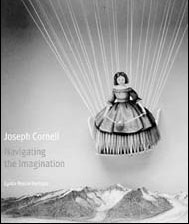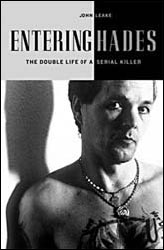Reviews
Books
Boxing Day

Joseph Cornell: Navigating the Imagination by Lynda Roscoe Hartigan (Peabody Essex Museum and Smithsonian American Art Museum/Yale University Press)
He had a thing for blue. Also clay pipes and Victorian postcards, ticket stubs, bits of tulle, starfish and old clock parts. He was drawn to Automats and secondhand-book stalls, corresponded with ballerinas, filmed pigeons, liked pie. These are among the oft-repeated facts about Joseph Cornell. Notice, in even so brief a litany, the transition from art to life and back again. Perhaps more than any other artist's work, Cornell's is best appreciated in the context of imagining the life of the man. Put another way: What Cornell lovers love most may be not the objects themselves - the evocative boxes, collages, dossiers and short films - but the story of their making, which is the story of an awkward dreamer walking the city, finding treasure in flotsam, spying magic all around. Lynda Roscoe Hartigan's mammoth catalog Joseph Cornell: Navigating the Imagination, accompanies the first retrospective of the artist's work in 26 years, a deliciously bountiful exhibition curated by Hartigan and recently on view in Washington, San Francisco and Salem, Mass. If you missed it, this book really is the next best thing: thorough, lavish, disturbing, beguiling, with its hundreds of sumptuous reproductions. Hartigan has done something lovely. She, too, has modeled a response to Cornell's work on his own methods, assembling and inventorying a pastiche of the ideas, innovations, people, philosophies and experiences that most likely influenced the artist. She doesn't navigate his imagination so much as map the explicit tributaries that fed it.
A murderous talent
Entering Hades: The Double Life of a Serial Killer by John Leake (Sarah Crichton Books/Farrar, Straus & Giroux)

Serial killers are localists. They murder within their chosen patch - a red-light district, a city quarter - and tend not to travel beyond it. Changing location means recoding the method: learning a new vernacular of murder. It also increases the risk of detection: An out-of-towner is more likely to be remembered from a crime scene. Jack Unterweger, the subject of John Leake's bleak book, had no anxieties about being remembered, nor about exporting his method. For this eerily charming dandy wasn't just a tourist but a murderer, who killed 12 women in four countries. Visiting Los Angeles in 1991 - ostensibly to research a radio program on prostitution - he dressed as a cross between a cowhand and a Mississippi preacher (white snakeskin boots and a white coat emblazoned with a hibiscus). By day he rode along with the Los Angeles Police Department on a journalist's ticket, observing its method and its milieu. By night he strangled prostitutes. Unterweger's idiosyncrasies stand out even within the idiosyncratic world of serial killers. When news of the first killings came to light, Unterweger - in an act of astonishing nerve - established himself as a key journalist covering the case.
Stand by your man
The Senator's Wife by Sue Miller (Alfred A. Knopf)
What might it feel like to be married to a charming and handsome man, highly accomplished, in many ways admirable, who propelled himself from modest beginnings to the highest reaches of our government, who professes undying love for you and appears to feel it, but who can't stop himself from repeatedly cheating on you in the most public and humiliating ways? What might it be like to stay married to this man, to spend years of your life campaigning for him, covering for him, while at the same time living apart, leading a separate life and discovering new and personally gratifying pleasures and ambitions? What would it be like to reunite with him, on your own terms, with your own power base, to love him more fully, perhaps even to trust him - only to have your faith finally, fatally shattered? These are the questions Sue Miller addresses in her latest novel, The Senator's Wife, a two-family saga about life on either side of a two-family house in the early years of the Clinton administration. Whitewater, Gennifer Flowers and the president's sexual wanderings are the snippets of news that stray into daily conversation in the New England college town where the senator's wife - with occasional "ceremonial visits" from the great man himself - lives her proud, solitary existence.
The New York Times Syndicate
(China Daily 01/17/2008 page20)














